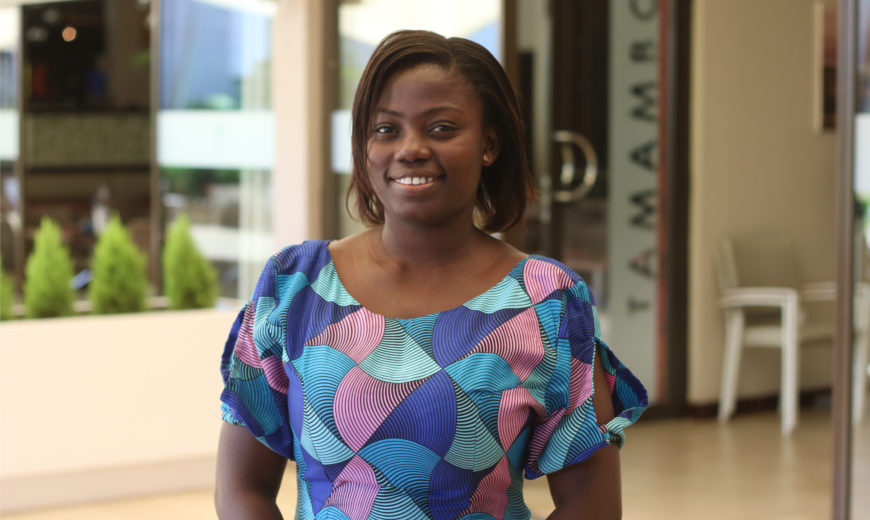12 Oct 2021
Q&A with Deborah Osei–Mensah, Fairtrade Youth Ambassador

As a registered cocoa farmer, Livelihood Development officer of Ghana’s Asunafo North Farmers Union, and leader of the union’s Monitoring and Evaluation team, Fairtrade Youth Ambassador Deborah Osei–Mensah has seen the impact of climate change on cocoa farmers and agricultural producers up close and personal.
“Over the course of my long-term relationship with farmers, I’ve seen climate change contribute to excessive rainfall, which causes erosion, and excessive sunlight making the soil dry and affecting the survival rate of newly planted cocoa,” the 31 year-old Osei-Mensah recently told Fairtrade.
“The river that serves my community and supports farm activities continues to dry up during the dry season and community members struggle to get water on their farms.”
Osei-Mensah is not the only agricultural producer witnessing climate change’s ravages on her farming community. Around the world, millions of farmers come into daily contact with a fast-changing environment, putting their livelihoods and lives at risk.
Now, as world leaders head into the upcoming 2021 United Nations Climate Change Conference, also known as COP26, the global Fair Trade movement is uniting to express a sense of urgency in achieving an inclusive climate action that leaves no one behind. And Fairtrade Youth Ambassadors like Deborah Osei–Mensah are helping the movement spread the movement’s key message: farmers and agricultural workers must be included in the COP26 outcomes and guaranteed fair incomes and financing to build back better and greener for a sustainable tomorrow.
Fairtrade International caught up with Osei-Mensah in the lead up to COP26 to ask her about how climate change has impacted her community and what she would like to see come out of the UN climate conference.
Please introduce yourself and tell us a little about how you became involved with Fairtrade and climate activism?
I started cocoa farming professionally about 6 years ago. On average, I harvest about 12 bags of cocoa per year. Growing up as a child, I had always seen cocoa farming labour intensive. In addition, it is a pity that our schools and communities regard students who pursue agricultural fields as students who are not academically brilliant, and this deterred me from appreciating farming. I also witnessed the methods of farming which leaves not much to be desired. However, having completed university and learning about sustainable agriculture through my affiliation with Asunafo Union, who are Fairtrade certified, my interest was revived not just to farming but to contribute to the protection of the environment and other natural resources and contribute to the protection of children especially the girl child. I have had the opportunity to join many Fairtrade programs and this has increased my interest for sustainability in the cocoa sector.
Climate change is having a disproportionate effect on producer nations, impacting farmers and agricultural workers around the world. How has climate change impacted your community?
Climate change has contributed to excessive rainfall which causes erosion and excessive sunlight making the soil dry and affecting the survival rate of newly planted cocoa. I personally planted 320 cocoa seedlings in 2018 and had to do a lot of replanting due to a heavy drought in that year. The river that serves my community and supports farm activities continues to dry up during the dry season and community members struggle to get water on their farms. This poses an additional danger for child labor as children might be asked to be late for school so they can help fetch water for the farm for spraying and other farming activities. Also, our farms depend on very good weather conditions to produce high yields and quality beans and such is not the case lately.
How have producers in your community adapted to the pressures and threats of climate change?
As a cooperative society and a member of a Fairtrade certified small-scale producer organization, we receive tree seedlings from the union (producer organization) to plant on our farms to provide shade for the cocoa trees
In November, global leaders will descend on Glasgow, Scotland to convene the UN climate conference known as COP26. If you could address these global leaders face-to-face, what climate action would you demand of them?
I believe we all in our small ways contributed to the change in climate, therefore there must be a guiding principle and regulations for all chocolate companies to contribute to regenerating our forest by supporting their farmers to adapt to climate smart agriculture and avoid sourcing cocoa from forest encroaching areas.
Fridays For Future. Zero Hour. Young people around the world have been mobilizing for climate action. As Fairtrade Youth Ambassadors representing producers from regions on the frontline of climate change, what advice would you give to young people seeking to make a difference?
Young people intensify climate campaigns and advocacy through awareness raising, educating farmers on the effect of climate change, and engaging duty bearers to enforce laws for the protection of our forests and rivers. Also, young people should play a leading role in tree planting exercises as well as any activity that is meant to protect the environment.